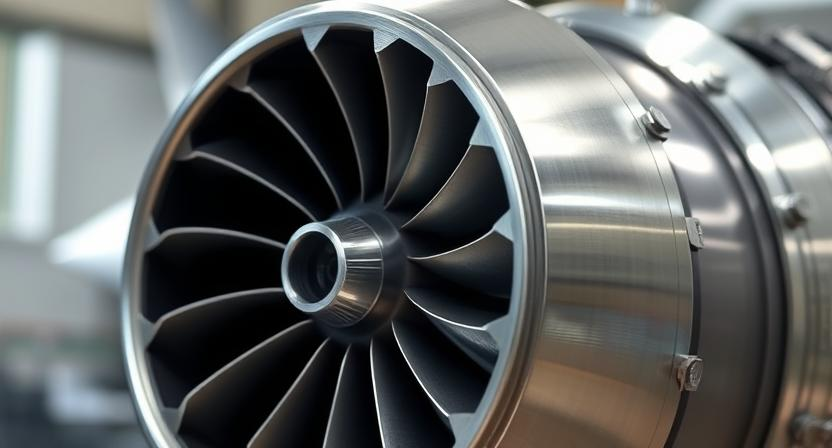Everything you need to know about titanium alloy 6al 4v, the most popular and versatile titanium grade in the world. Often called Ti-6Al-4V or titanium ti 6al 4v, this material is a true workhorse across many industries.
Common Names: Grade 5 Titanium, Ti-6-4, ti6al4v titanium alloy
Composition: 6% Aluminum (Al), 4% Vanadium (V), 90% Titanium (Ti)
Key Feature: Excellent strength-to-weight ratio and superior corrosion resistance.
Classification: Alpha-Beta Alloy (meaning it can be heat-treated for higher strength).
Ti-6Al-4V is the most widely used titanium alloy, making up almost 50% of the total titanium used globally. It's a high-performance material known for its amazing combination of properties. The name itself tells you its main ingredients: 6% Aluminum and 4% Vanadium, mixed with pure Titanium. This specific mix gives the alloy its incredible strength while keeping it lightweight.
If you are searching for titanium alloy 6al 4v, you are looking for a material that can handle tough jobs where both strength and low weight are critical. From jet engines to medical implants, this alloy is the industry standard.
The reason titanium ti 6al 4v is so popular comes down to its unique properties. It offers a perfect balance that other metals struggle to match. Understanding these properties is key to choosing the right material for your project.
This is the biggest selling point. Ti-6Al-4V is much stronger than pure titanium and many steels, yet it is about 40% lighter than steel. This makes it essential for aerospace and racing applications where every gram counts.
Like pure titanium, ti6al4v titanium alloy forms a thin, protective oxide layer on its surface. This layer makes it highly resistant to corrosion from seawater, many industrial chemicals, and even body fluids, which is why it's used for implants.
As an alpha-beta alloy, titanium alloy 6al 4v can be heat-treated. This process allows manufacturers to adjust its microstructure, leading to even higher strength and better performance in different environments.
The human body does not reject **Ti-6Al-4V**. It is non-toxic and integrates well with bone tissue, making it the top choice for medical and dental applications.

| Property | Typical Value (Annealed) | Unit |
|---|---|---|
| Density | 4.43 | g/cm³ |
| Tensile Strength (Ultimate) | 950 - 1160 | MPa |
| Yield Strength (0.2% Offset) | 880 - 1100 | MPa |
| Elongation at Break | 10 - 18 | % |
| Modulus of Elasticity | 114 | GPa |
Because of its superior properties, ti6al4v titanium alloy is found in critical components across many high-tech and demanding industries. If a product needs to be strong, light, and reliable, this is the material of choice.
This is the largest market for titanium ti 6al 4v. It is used for:
Engine Components: Blades, discs, and casings in jet engines.
Airframe Parts: Landing gear, structural frames, and fasteners.
Spacecraft: Pressure vessels and rocket motor cases due to its high strength at elevated temperatures.
The biocompatibility of titanium alloy 6al 4v is a game-changer for medicine:
Surgical Implants: Hip and knee replacements, bone screws, and plates.
Dental Implants: Posts and fixtures that fuse directly with the jawbone.
Surgical Tools: Lightweight and non-magnetic instruments.
High-performance vehicles use Ti-6Al-4V to reduce weight and improve efficiency:
Engine Valves and Connecting Rods: For high-revving engines.
Exhaust Systems: Where high heat and corrosion resistance are needed.
Its resistance to saltwater corrosion makes it perfect for the ocean environment:
Submersible Components: Housings and structural parts for deep-sea vehicles.
Heat Exchangers: In power plants and desalination facilities.

Working with Ti-6Al-4V: Machining and Welding
While Ti-6Al-4V is an amazing material, it can be challenging to work with. Manufacturers need specialized knowledge and equipment to process it correctly.
Machining ti6al4v titanium alloy is difficult because it is strong and has low thermal conductivity. This means heat builds up quickly at the cutting edge, leading to tool wear. Key tips for machining include:
Using sharp tools and rigid setups.
Employing slow speeds and high feed rates.
Using plenty of coolant to manage heat.
Titanium ti 6al 4v is generally considered weldable, but it requires great care. The main challenge is preventing contamination from the atmosphere (oxygen and nitrogen) which can make the weld brittle. Welding must be done under an inert gas shield, like Argon, in a clean environment.
The alloy can be annealed (softened) or solution treated and aged (strengthened). This flexibility allows the final product to be tailored for specific performance requirements.
You can find titanium alloy 6al 4v in many forms, depending on your manufacturing needs:
Bar and Rod: Used for fasteners, shafts, and machined parts.
Plate and Sheet: Common for airframe skins and structural components.
Wire: Used for welding filler material and medical wires.
Powder: Essential for Additive Manufacturing (3D Printing) processes like Laser Powder Bed Fusion (LPBF).
A special version of the alloy is Ti-6Al-4V ELI. This grade has lower amounts of interstitial elements like Oxygen, Nitrogen, and Iron. This makes it more ductile and fracture-resistant, which is crucial for very low-temperature (cryogenic) applications and most medical implants.
When buying ti6al4v titanium alloy, quality and certification are everything. You need a supplier who understands the demands of your industry.
Check Certifications: Look for ISO 9001, AS9100 (Aerospace), or ISO 13485 (Medical) certifications.
Ask for Mill Test Reports (MTRs): These reports confirm the exact chemical composition and mechanical properties of the batch you are buying.
Verify Traceability: Ensure the material can be traced back to the original mill and melt.
Choosing the right titanium ti 6al 4v supplier ensures your final product meets all safety and performance standards. For a reliable source of high-quality **Ti-6Al-4V** in various forms, we recommend checking out China Titanium Factory, a trusted name in the industry.